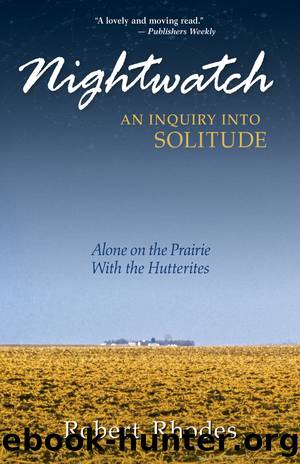Nightwatch by Robert Rhodes

Author:Robert Rhodes
Language: eng
Format: epub
Publisher: Skyhorse Publishing
Published: 2009-09-15T00:00:00+00:00
Central to life in community is also the Hutterian stance in favor of peace and nonviolence. In the Sermon on the Mount, in Matthew 5-7, Jesus taught that believers are to do no violence to anyone, and in fact, to love their enemies. The Hutterites take this to mean that they should not only abstain from violent acts against individuals, but that they should also not fight in wars or take part in civil unrest, even in self-defense. The Hutterites feel that God will protect them in times of strife and violence, and that if they are attacked, it is their perception of Godâs will and not theirs that should prevail.
Hutterites also refuse to swear oaths or involve themselves in the government. They do pay taxes, contrary to what some believe, because they were told to ârender unto Caesarâ what is his, and unto God what is Godâs. The Hutterites find no compromise in doing this, viewing it as an act of love to their neighbors and a way of supporting projects that many will benefit from. But their faith comes first in matters of doing violence, and so they do not involve themselves in the military or any war-related or defense-related activity, even in their business pursuits.
Before he was burned at the stake at Innsbruck, Austria, in 1536, Jakob Hutter wrote of his followersâ peace convictions in a letter to the governor of Moravia. Part of this letter is preserved in the Chronicle of the Hutterian Brethren, published in English translation by Plough Publishing House.
âAll our words and deeds, our conduct, our way of life, are there for all men to see,â Hutter wrote. âRather than knowingly wrong a man to the value of a penny, we would let ourselves be robbed of a hundred gulden. Rather than strike our worst enemy with our hand â to say nothing of spears, swords, and halberds such as the world uses â we would let our own lives be taken. As anyone can see, we have no physical weapons, neither spears nor muskets.â
Over the years, Hutterites have been conscientious objectors to any military service, a status that has resulted in no small number of reprisals against them and their communities, and which has even cost lives in modern times. During World War I, four young Hutterian men were drafted and sent to the federal penitentiary at Alcatraz in San Francisco Bay. Later, in the final weeks of the war and during a nationwide influenza pandemic, they were sent by train to the U.S. Disciplinary Barracks at Fort Leavenworth, Kansas, for refusing to wear the military uniform or to do military service of any kind.
This federal prison, blazing hot in the summer and alternately cold and stultifying from steam heat in winter, was still in use as the 21st century dawned. In November 2002, when I was a journalist with Mennonite Weekly Review, I toured the prison with a young army sergeant who had been a guard there before the prisoners were moved to a new, state-of-the-art facility elsewhere on the base.
Download
This site does not store any files on its server. We only index and link to content provided by other sites. Please contact the content providers to delete copyright contents if any and email us, we'll remove relevant links or contents immediately.
The Old Farmer's Almanac 2020 by Old Farmer’s Almanac(1731)
1610396766 (N) by Jo Ann Jenkins(1681)
Botswana--Culture Smart! by Michael Main(1601)
In Arabian Nights by Tahir Shah(1564)
Whatever You Do, Don't Run by Peter Allison(1562)
Dead Eye by Mark Greaney(1521)
Livingstone by Tim Jeal(1489)
The Templars by Michael Haag(1423)
Top 10 Israel and Petra by DK Travel(1401)
Ubuntu by Ellis Heather;(1398)
First Comes Love, then Comes Malaria by Eve Brown-Waite(1395)
Africa: Altered States, Ordinary Miracles by Richard Dowden(1384)
Morocco Travel Guide by Lonely Planet(1379)
Egypt Travel Guide by Lonely Planet(1371)
False Papers by André Aciman(1352)
The Promise of a Pencil: How an Ordinary Person Can Create Extraordinary Change by Braun Adam(1348)
Jeff Corwin by Jeff Corwin(1316)
The Masked Rider by Neil Peart(1293)
African Nights by Kuki Gallmann(1259)
